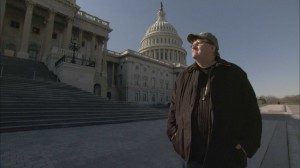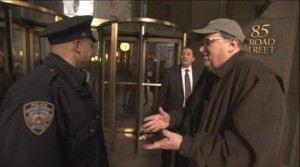Capitalism: A Love Story
 There are occasions where only hearing a person talk will tell you enough to determine the expression on her face. The tone and volume will tell you everything, with no visual required.
There are occasions where only hearing a person talk will tell you enough to determine the expression on her face. The tone and volume will tell you everything, with no visual required.
Current color commentator and former New York Knicks great Walt “Clyde” Frazier is a perfect example of this. Just listening to the radio, you can hear the pleasure he not only derives from describing the game (“bumbling and stumbling in the lane”) but even, it appears, living life, gives you a good hint; there’s a permanent wide grin attached to his creatively mustached face.
The same can be said during the opening of Michael Moore’s Capitalism: A Love Story (minus the mustache), as Moore’s opening voiceover, your shoulders may slump and you may sigh as you hear the condescension in his voice. His treacly, needy, puppy dog, solemnity is punctuated by the knowing derision of his subject. Moore’s cadence is always predictable and it underlines his unfortunate insistence upon inserting himself unnecessarily into the much more compelling material at hand. And for the first fifteen minutes of Capitalism: A Love Story, you’ll probably stay in that asleep-in-8th-grade-history-class mode, as the movie hammers away at the “what happened to this great land?” theory, a virtual continuation of Moore’s first film, Roger and Me, which concluded with an ironic use of The Beach Boys’ Wouldn’t It Be Nice?
 But Moore manages to [relatively] focus and settle down, mostly avoiding the preaching-to-the-converted pitfalls, and the maudlin, Barbara Walters-style touches of wringing tears out of his interviewees and the audience through the most callow and manipulative devices. While he still stacks the deck, never helped by his bad habit of trying to make the security guards of whatever building he’s trying to ambush look complicit in the schemes of the large corporation he’s after, there are enough scenes portraying callously inhuman policies, such as the death peasant insurance (where your company, unbeknownst to you, will take out a life insurance policy on you, no matter if you’re a CEO or a cashier at Wal-Mart) to pacify the viewer for two overlong hours.
But Moore manages to [relatively] focus and settle down, mostly avoiding the preaching-to-the-converted pitfalls, and the maudlin, Barbara Walters-style touches of wringing tears out of his interviewees and the audience through the most callow and manipulative devices. While he still stacks the deck, never helped by his bad habit of trying to make the security guards of whatever building he’s trying to ambush look complicit in the schemes of the large corporation he’s after, there are enough scenes portraying callously inhuman policies, such as the death peasant insurance (where your company, unbeknownst to you, will take out a life insurance policy on you, no matter if you’re a CEO or a cashier at Wal-Mart) to pacify the viewer for two overlong hours.
Not only does he go after corporations and their exploitation of the worker, Moore goes after the sacred cow of our capitalistic financial system as a whole. Validly making the distinction between capitalism and democracy and showing how the erosion of the middle class has eliminated the notion of the American Dream (exacerbated by the only booming industry in a small town being the guy who makes foreclosure signs), specifically in the way we might believe that we’re going to “make it.” One of his most clever gambits is by interviewing various priests about how Jesus would view capitalism (uniformly they say he’d be against it), undermining the conservative tendency to claim Christianity as an overriding influence in their financially driven lifestyles.
 That’s not to say that Moore completely sets himself up for castigation from the right; he also pines for the 1950s, which he perceives as both a time of innocence, prosperity, and equality, another calling card of conservative Christians. Whether Moore actually believes in the 1950s as a utopia is unclear;it may just be his way of intertwining the success of America with the success of unions. Of course, bolstering unions was probably the point in the first place; it allows Moore to explain what actual Socialism is and how most of our current successful current programs are based on it (Medicare, Police, etc.). It’s quite a stretch though, that if FDR had lived long enough to pass the additional Bill of Rights that he had proposed, everyone would actually be equal and corporations would have never been able to monopolize; Moore is always going after the consequences of human greed, but nothing he could suggest would ever overcome natural instinct. His standard tropes distract him from the task at hand. And so for every valid idea he presents, especially the enormity of how much control failed Goldman-Sachs executives now run the country (“people who give you the wrong answer, but the one you want to hear, are invaluable”), there’s a tangent about house squatters or idle threats from an exasperated former home owner.
That’s not to say that Moore completely sets himself up for castigation from the right; he also pines for the 1950s, which he perceives as both a time of innocence, prosperity, and equality, another calling card of conservative Christians. Whether Moore actually believes in the 1950s as a utopia is unclear;it may just be his way of intertwining the success of America with the success of unions. Of course, bolstering unions was probably the point in the first place; it allows Moore to explain what actual Socialism is and how most of our current successful current programs are based on it (Medicare, Police, etc.). It’s quite a stretch though, that if FDR had lived long enough to pass the additional Bill of Rights that he had proposed, everyone would actually be equal and corporations would have never been able to monopolize; Moore is always going after the consequences of human greed, but nothing he could suggest would ever overcome natural instinct. His standard tropes distract him from the task at hand. And so for every valid idea he presents, especially the enormity of how much control failed Goldman-Sachs executives now run the country (“people who give you the wrong answer, but the one you want to hear, are invaluable”), there’s a tangent about house squatters or idle threats from an exasperated former home owner.
The scattered nature of Capitalism: A Love Story is in line with Moore’s other films, but it reaffirms the notion that his TV shows, TV Nation and The Awful Truth were better suited for his style. Broken up into 8-10 minute chunks and with no need for a thru-line, he wouldn’t have to tie unrelated strands together (whatever its merits, Bowling For Columbine is a totally disorganized mess) and his points would come through more clearly. Sicko, Moore’s documentary about the failure of American healthcare was a very important film. But his message was made more succinctly and effectively in an episode of The Awful Truth where a man denied life saving surgery by his insurance company inspired Moore to hold a formal funeral, while the man was still alive, in front of the HMO’s headquarters (the shopping for caskets sequence is truly hilarious and unsettling). It reminds you that Capitalism: A Love Story could have been a much tighter, sharper film, if Moore had been willing to reign himself in.
 Besides, no muckraking, message-driven documentary should ever be trumped by a single image from John Carpenter’s campy sci-fi satire They Live, where wrestler Roddy Piper discovers some glasses that allow him to see the truth about America in the 1980s. With the aid of the glasses, one look at a dollar bill reveals its true nature, as instead of George Washington and all of our proud, green accomplishments, it’s simply a piece of paper that says “This is your God.” Subtle? No. But no more blatant and on-the-nose than anything Moore gives us. And it might give you the idea that since Piper has beaten Moore at his own game, perhaps Moore should try his hand in the wrestling ring. I wonder if the Corporate Avenger moniker is already taken.
Besides, no muckraking, message-driven documentary should ever be trumped by a single image from John Carpenter’s campy sci-fi satire They Live, where wrestler Roddy Piper discovers some glasses that allow him to see the truth about America in the 1980s. With the aid of the glasses, one look at a dollar bill reveals its true nature, as instead of George Washington and all of our proud, green accomplishments, it’s simply a piece of paper that says “This is your God.” Subtle? No. But no more blatant and on-the-nose than anything Moore gives us. And it might give you the idea that since Piper has beaten Moore at his own game, perhaps Moore should try his hand in the wrestling ring. I wonder if the Corporate Avenger moniker is already taken.
[This review originally appeared in an abbreviated version on BroadStreetReview.com.]



